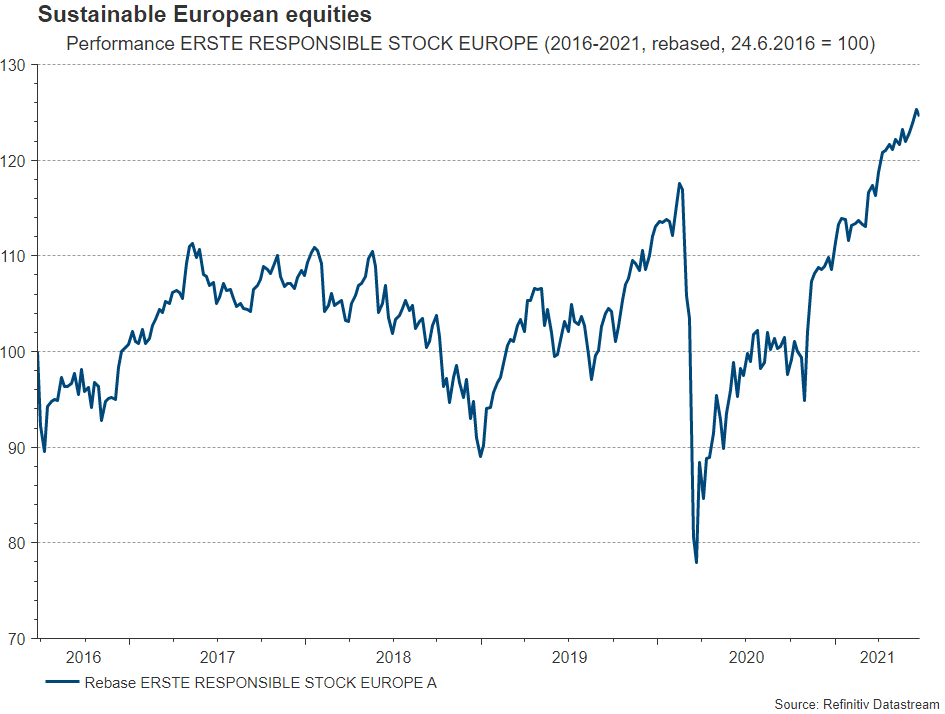On 23 June 2016, the British voted to leave the European Union by a narrow majority of 52 per cent, triggering political upheaval. Five years of tough negotiations later, the exit is a reality. After the UK left the Union at the end of 2020, the country is no longer a member of the EU Customs Union and the Single Market since 1 January 2021.
The initial assessment is mixed. The hopes of Brexit supporters for rapid economic growth thanks to the country’s separation from the EU have not been fulfilled so far, partly due to Corona. However, the catastrophe feared by Brexit opponents has also failed to materialise. Politically, Brexit is likely to continue to cause unrest for some time, but economically, the UK is on a good path.
The economy is picking up after Corona and lockdowns – but so is inflation
After a pandemic-related decline in Q1, the UK’s economy is expected to recover significantly in the second quarter. According to current forecasts by the Confederation of British Industries (CBI), the UK’s gross domestic product (GDP) could return to pre-pandemic levels by the end of this year. The CBI experts forecast GDP growth of 8.2 per cent this year, followed by 6.1 per cent next year. Above all, domestic demand, which has increased with the reopening of shops and restaurants, could boost the economy, experts expect.
Business sentiment also remains good. The German Purchasing Manager’s Index compiled by the IHS Markit Institute recently fell in June, but from a high level. The index fell by 1.2 points to 61.7, however, it is the highest it has been since the survey began in 1998 according to Markit.
The British labour market has also shown signs of recovery recently. Employment rose for the sixth consecutive month in May, with the employment rate now at 75.2 per cent, according to the Office for National Statistics (ONS). At 28.5 million, however, employment was still a good half million below the level before the Corona pandemic. At the same time, the unemployment rate fell to 4.7 per cent. IHS Markit surveys point to a continuation of the labour market recovery. In the surveys, many companies reported a high willingness to hire new staff.
However, this is also contrasted by inflation fears that are growing with the recovery. In May, consumer prices were 2.1 per cent higher than in the previous year. This is the strongest inflation since July 2019, according to the ONS. Other developed nations are also currently seeing rising inflation rates amid increasing energy prices and the recovery thanks to steadily progressing Corona vaccination programmes. Markit economists also blame rising prices of intermediate goods and commodities on supply chain issues.
Export industry, agriculture and many employers suffering from the exit
On the industry side, the assessment is also mixed. While domestic demand is booming, the export industry is naturally feeling the impact of the exit from the EU single market and the associated trade difficulties. For the first time since records began in 1997, Britain traded more with non-EU countries than with the Community in Q1.
The automotive industry, for example, which depends on seamless supply chains, is suffering from a flood of new regulations for the exchange of goods. The food industry has also recently suffered heavy losses. In the first quarter of this year alone, British food exports to the EU fell by 47 per cent compared to the previous year.
In addition, some sectors have also lost important workers from the EU area with the EU exit and the associated difficulties regarding labour and residence permits. Since the reopening of pubs and restaurants after the lockdown, restaurateurs have had increasing problems finding suitable staff. July also marks the end of a transitional period that had until now guaranteed EU citizens the right to live and work in Britain as well as access to the health system. Many businesspeople are now calling for more liberal regulations in order to be able to continue employing EU citizens.
Finally, Brexit opponents also fear an exodus of companies from the financial metropolis of London. The City is still the undisputed number one among Europe’s financial centres. But studies are already pointing towards migration movements from which Frankfurt could benefit.
At any rate, the general economic recovery was noticeable on the London stock exchange itself this year. By the end of June, the British share index FTSE had risen more than 8 per cent. On other markets, however, it went up even more strongly: the Euro-Stoxx-50 of the eurozone’s most important companies showed a plus of more than 15 per cent and the German DAX of more than 13 per cent in the same period. The British pound, on the other hand, was able to widen the gap against the euro considerably over the course of the year.
Brexit divides population, politicians, Northern Ireland and perhaps also Scotland
Politically, however, Brexit continues to be hotly disputed and to divide the country. According to the latest polls, Brexit opponents and supporters are currently more or less evenly balanced among the population, with the fissures also running within the Conservative Party. Prime Minister Boris Johnson, for example, on the occasion of the anniversary of the Brexit referendum, remained confident of the present course: “If we now recover from this pandemic, we will use the true potential of our regained sovereignty to unite and raise our entire United Kingdom to a higher level”. Johnson’s party colleague and ex-vice-governor Michael Heseltine, on the other hand, spoke of “ominous prospects” – for the fishing industry, agriculture, London’s financial centre, for example, but also for peace in Northern Ireland.
Due to the Brexit agreement, Northern Ireland is de facto still part of the EU single market and the customs union, but this has created a goods border with the rest of the kingdom. Some observers therefore see the peace process in Northern Ireland at risk, for others this has made a referendum for reunification with the Republic of Ireland more likely. In Scotland, too, a referendum on secession from the United Kingdom and a return to the EU could come in a few years. The Scottish head of government, Nicola Sturgeon, is generally aiming for such a referendum, but is likely to wait a little longer.
How to invest in UK stocks?
Those who are betting on a resurgence of the European economy, including Great Britain, can use ERSTE RESPONSIBLE STOCK EUROPE in their investment. This fund focuses on high-quality, high-growth shares of companies that are pioneers in terms of environmental, social and corporate governance aspects. British equities currently account for around 20 percent of the portfolio. The higher fluctuation intensity for equity funds must be taken into account.


Legal disclaimer
This document is an advertisement. Unless indicated otherwise, source: Erste Asset Management GmbH. The language of communication of the sales offices is German and the languages of communication of the Management Company also include English.
The prospectus for UCITS funds (including any amendments) is prepared and published in accordance with the provisions of the InvFG 2011 as amended. Information for Investors pursuant to § 21 AIFMG is prepared for the alternative investment funds (AIF) administered by Erste Asset Management GmbH pursuant to the provisions of the AIFMG in conjunction with the InvFG 2011.
The currently valid versions of the prospectus, the Information for Investors pursuant to § 21 AIFMG, and the key information document can be found on the website www.erste-am.com under “Mandatory publications” and can be obtained free of charge by interested investors at the offices of the Management Company and at the offices of the depositary bank. The exact date of the most recent publication of the prospectus, the languages in which the fund prospectus or the Information for Investors pursuant to Art 21 AIFMG and the key information document are available, and any other locations where the documents can be obtained are indicated on the website www.erste-am.com. A summary of the investor rights is available in German and English on the website www.erste-am.com/investor-rights and can also be obtained from the Management Company.
The Management Company can decide to suspend the provisions it has taken for the sale of unit certificates in other countries in accordance with the regulatory requirements.
Note: You are about to purchase a product that may be difficult to understand. We recommend that you read the indicated fund documents before making an investment decision. In addition to the locations listed above, you can obtain these documents free of charge at the offices of the referring Sparkassen bank and the offices of Erste Bank der oesterreichischen Sparkassen AG. You can also access these documents electronically at www.erste-am.com.
Our analyses and conclusions are general in nature and do not take into account the individual characteristics of our investors in terms of earnings, taxation, experience and knowledge, investment objective, financial position, capacity for loss, and risk tolerance. Past performance is not a reliable indicator of the future performance of a fund.
Please note: Investments in securities entail risks in addition to the opportunities presented here. The value of units and their earnings can rise and fall. Changes in exchange rates can also have a positive or negative effect on the value of an investment. For this reason, you may receive less than your originally invested amount when you redeem your units. Persons who are interested in purchasing units in investment funds are advised to read the current fund prospectus(es) and the Information for Investors pursuant to § 21 AIFMG, especially the risk notices they contain, before making an investment decision. If the fund currency is different than the investor’s home currency, changes in the relevant exchange rate can positively or negatively influence the value of the investment and the amount of the costs associated with the fund in the home currency.
We are not permitted to directly or indirectly offer, sell, transfer, or deliver this financial product to natural or legal persons whose place of residence or domicile is located in a country where this is legally prohibited. In this case, we may not provide any product information, either.
Please consult the corresponding information in the fund prospectus and the Information for Investors pursuant to § 21 AIFMG for restrictions on the sale of the fund to American or Russian citizens.
It is expressly noted that this communication does not provide any investment recommendations, but only expresses our current market assessment. Thus, this communication is not a substitute for investment advice.
This document does not represent a sales activity of the Management Company and therefore may not be construed as an offer for the purchase or sale of financial or investment instruments.
Erste Asset Management GmbH is affiliated with the Erste Bank and austrian Sparkassen banks.
Please also read the “Information about us and our securities services” published by your bank.



